Since Amazon has not yet opened for business in Johnston, the mega-retailer has invoked a costly construction clause in its contract with the town.
Over the past few months, the company …
This item is available in full to subscribers.
We have recently launched a new and improved website. To continue reading, you will need to either log into your subscriber account, or purchase a new subscription.
If you are a current print subscriber, you can set up a free website account by clicking here.
Otherwise, click here to view your options for subscribing.
Please log in to continue |
|

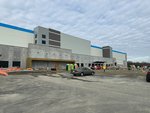

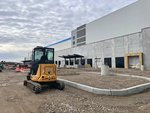







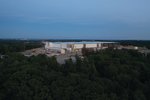





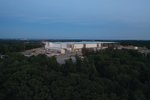



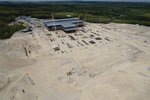


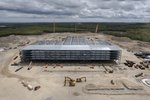



Since Amazon has not yet opened for business in Johnston, the mega-retailer has invoked a costly construction clause in its contract with the town.
Over the past few months, the company successfully negotiated a deal to pay the town $1.5 million less than initially promised (though the town’s financial advisors say the real deficit’s more like $618,000 in fiscal terms).
On Monday night, Johnston Town Council unanimously approved a revised tax agreement with Amazon.
“There is a construction clause that indicates if the certificate of occupancy is not issued by Jan. 1, 2024, Amazon will pay a pro-rated share, based on percentage of construction completed,” Johnston Mayor Joseph Polisena Jr. told the council Tuesday.
The Amazonians
Four representatives from Amazon, a woman and three men in suits with no ties, sat quietly two rows behind Polisena during the meeting (the three men sat together, and the woman sat in the row behind them). None of the four stood to speak during the public session discussion.
The men sat silently, only occasionally laughing at the jokes cracked by the town’s top elected officials and attorneys, reviewing potential scripts that were encased in black and clear report folders.
Clearly visible to the reporter in the row behind them, one of the men’s potential scripts identified him as Jonathan Greeley, who leads Amazon’s Economic Development Work in New England.
“I’m pleased to be here tonight to provide an update on our Johnston construction project, known internally as PVD2, and discuss the proposed revised Tax Stabilization Agreement (TSA) for the Project,” the document read (this Johnston Sun Rise reporter photographed and read the document over the Amazon rep’s shoulder).
“At the outset I’d like to thank the Mayor and his team, the Town Council and the Town of Johnston for continuing to be amazing partners on this project,” the document read. “Your collaboration from project to conception to now has been critical.”
Silent Attendees
The script, intended for the public and the Town Council but never read into the record, continued: “As you may recall from the last time we appeared in front of this body, Amazon has partnered with Bluewater Property Group to build a 5-story, 3.8 (million) square (foot) Amazon Robotic fulfillment center. When complete, more than 1,500 employees will pick, pack, and sort packages before they are loaded onto line haul trucks and transported to nearby sortation and logistics facilities across the northeast. Thanks to the innovations of Amazon robotics our people will be working alongside advanced robotics technology, allowing them to learn new skills and helping create a more efficient process to meet customer demand.”
The letter went on to compare the size of the facility to 66 athletic (the exact sport was partially obscured by a resting hand) fields.
“As you might imagine given the size and function, this construction process (has been) complex,” the script continued, but the document was partially obstructed by the man’s hand (who was holding it).
A few more bits were visible. Greeley had planned to blame some of the delays on “supply chain challenges” and “inflationary” (something … not visible from the row behind). The Amazon official had planned to tell the council that the company had “expressed optimism” that they would still be able to open on time, but alas, that didn’t happen.
Delay Delayed
After the meeting adjourned, the four Amazon reps stood outside the Johnston Municipal Court chatting, openly discussing whether they should have addressed the meeting.
The Johnston Sun Rise offered them the opportunity to speak directly to the residents of Johnston, through their local newspaper. They were asked when the facility on the hill off Hartford Avenue would finally open (the opening and hiring of 1,500 people has faced several delays over the past year).
All four declined comment, and one of the men (the same one holding Greeley’s script) said they would just defer to the most recent statements from Amazon spokesman Steve Kelly (who told the Sun Rise last month that the facility is expected to open by the end of this year). Amazon said the same thing last year, but the facility remains unfinished.
“The timeline has not changed for us — still slated for later this year,” Kelly wrote on March 13.
Polisena, who rarely attends Town Council meetings, spoke briefly prior to the vote. He told Town Council that “we tried very hard but there was no way to issue them (an occupancy permit) for their building.”
“We were approached by Amazon in the fall and they said that they would be invoking this construction clause,” Polisena explained. “And they initially came to us and said the number that they felt comfortable paying on the initial, the original $5.7 million, was $2.7 million, which is a $3 million shortfall. That would be a $3 million shortfall for this budget.”
Money Already Spent
The mayor was in a tricky spot. He had assured the voters of Johnston, when they went to the polls to approve a $215 million bond for new school construction, that there would be “no tax increase” tied to the project. He promised the taxpayers of Johnston that Amazon’s regularly scheduled annual payments over the next 20 years would pay for the new schools.
The school construction has already started and more than $40 million in contracts have been approved. The site of the town’s new elementary center has been cleared and a ground-breaking ceremony has now been announced for 10 a.m. on Saturday, May 4.
The school’s groundbreaking ceremony will be held before the Amazon facility’s ribbon-cutting.
“My administration is not OK with that,” Polisena told Town Council, referring to Amazon’s initial proposed reduction in this year’s payment by $3 million. “And, after a few productive meetings, we came up with this alternative plan.”
According to Polisena, the town has already received this year’s $5.7 million payment, but it was kept in escrow pending Monday night’s vote.
“So Amazon is going to pay the full $5.7 million this year … They’re giving us an extra half a million dollars next year, and then in 10 years, in the years 11 through 20, they’ll get $200,000 off per year … We spoke to our fiduciary,” Polisena explained to Town Council. “As you guys know … money is worth more today than it is in the future. If you use a 10-year treasury, with the additional half a million dollars we get, and the present value of years 11-20, it comes out to a difference of $618,000.”
At face-value, the reduction of $200,000 per year over the last 10 years of the TSA totals $2 million (in overall payment reductions).
“So this was very important to me to get done,” Polisena told Town Council. “I take my responsibility seriously, and having a $3 million shortfall … It’s not good for anybody. It’s not good for the town. I’m appreciative of Amazon understanding this. I’m appreciative of the extra half a million dollars they’ve given us.”
Flood Money
The “extra” half million dollars will be used toward remediating widespread flooding issues in town, according to Polisena and Attorney William E. O’Gara.
Some of Johnston’s worst flood-spots are directly downhill from the new, massive Amazon facility (though many of those spots have been historically flood-prone).
O’Gara, partner with Johnston law firm Pannone Lopes Devereaux & O’Gara, addressed Town Council (he attended the meeting with fellow firm attorney former Cranston Mayor Allan Fung, who sat in the solicitor’s chair Monday night).
“We had a lengthy discussion with the town’s financial advisor … to sort of have a check to make sure that our view of the impact on the town was on the money,” O’Gara explained. “And he looked at the impact and he valued the impact at … the net present value, as indicated by the mayor, at $618,630.67. And he indicated that his feeling was that what the Amazon agreement does for the town, which is provide a stream of revenue to offset the costs of the bonds in connection with the elementary school, middle school and high school project. That that was going to remain intact, and he described the impact as modest.”
The Backend
Due to many of the same reasons Amazon cited for construction delays, the school projects have also been revised.
The town may no longer renovate the middle school, despite the pitch delivered to voters when they passed the school construction bond referendum. The plans now call for a new elementary center and a mostly new high school (plans call for preservation of the JHS gymnasium, with a completely new building constructed around it, between the current school and the football stadium).
“When you look at the stream of revenue that the tax treaty pays, it’s … approximately 1%,” O’Gara said. “It’s a 1% impact. And again, the 1% … is on the back end of the deal. So when you do that calculation, as to what the actual cost to the town is today, it’s that $618,000 number … Ultimately, we preserved for the town the benefits that the tax treaty provides and it allows the town to go forward with certainty as to the revenue stream.”
According to O’Gara, Polisena’s administration also negotiated an agreement with Amazon that future annual payments will be made each year, in a single payment, before Jan. 30.
“From a budgeting standpoint, that’s beneficial,” O’Gara told Town Council.
Sticky Point
Polisena and Ward 5 Town Councilman Robert Civetti briefly debated whether it would make more sense to use the town’s reserve funds to cover the Amazon shortfall, than lose money in the future.
“What I would have liked … to at least (have been) able to see our financial statements,” Civetti told the mayor. “I’ve requested financial statements from them … (the town’s) finance director, he hasn’t provided anything. I’ve made several requests.”
Last year, the town ended in the black. And for the past year, Civetti has been publicly requesting budget updates and financial statements from Polisena’s administration, during public meetings, but he says his requests have been ignored.
“If you look back at our June 30, 2023 audit, we finished with a budgetary surplus of $3.2 million,” Civetti said. “So I don’t know where we stand currently. If we’re on the same pace, we certainly could have covered the $2 million shortfall … I don’t necessarily like kicking the can down the road … It might be short-sighted, because again, we don’t know where we stand. I feel I’m being asked to make a decision on something (without adequate information).”
Civetti works as a certified public accountant (and has a client-list that includes at least one other Rhode Island municipality). He’s familiar with projects and budgets of this scale, and the sound numbers make when you crunch them. Civetti offered to make a motion to amend the pending revised TSA ordinance.
“Let’s appropriate $3 million from our fund balance, so that the administration has a balanced budget … I just don’t see a need to be shorting future years, when we don’t know what the financial position of the town’s going to be,” he argued.
The mayor sounded frustrated as he rose to disagree.
“So, rather than short the town $1.5 million, which is essentially $200,000 from years 11 to 20, you’d rather short the town $3 million?” Polisena asked Civetti.
“We allocated the Amazon money,” the mayor told the councilman. “As I’ve said multiple times, the annual Amazon revenue always exceeds the bond payment … I’m not going to forego $3 million this year so we don’t forego $1.5 million in years 11 through 20.”
“I’d rather lose $1.5 million, over a 10-year span, 10 years from now, so it can be planned for -- again, it’s only $200,000 — than just leave $3 million on the table now,” Polisena concluded.
Civetti eventually voted with the rest of Town Council to approve the revised TSA with Amazon.
O’Gara further argued that the renegotiated TSA was a good deal for Johnston.
“With respect to the idea of essentially this resolution, which is you maintain the payment that you were counting on this year when you constructed a budget … You receive an additional $500,000 next year to deal with the flooding issues,” he said. “And that essentially Amazon agreed to take payments 11 years out, at a point of time where the payments under the tax treaty have escalated pretty significantly. The payments are going to ramp up from $5.7 (million) to get to $8.9 million in year 20 … Providing a credit to Amazon, you’re providing those in years where your payments are going to significantly exceed what your anticipated debt service is for the school bonds.”
Swift Delivery
The ordinance was ultimately approved with a unanimous vote of Town Council after a pair of public hearings (the first held on Thursday, March 28, and the second on Monday, April 8).
Civetti asked for an update on the promised payments from Amazon for local organizations, like Johnston youth sports and the Johnston Senior Center, which were contingent upon Amazon opening its doors. The attorney and the mayor said the details have yet to be settled.
To end his argument for a re-negotiated TSA, O’Gara lightened the mood, providing an example from his own tax bill.
“I live in Westerly, and we passed a small bond,” he recalled. “And they told us, ‘Your taxes are going up a couple hundred dollars to pay for that.’ Because we don’t have anyone who’s going to send us (payments like Amazon) … Taylor Swift sends us some money, but she doesn’t (send) us … $7 million a year.”
Some people in the audience laughed. The three men from Amazon laughed the loudest.
Comments
No comments on this item Please log in to comment by clicking here